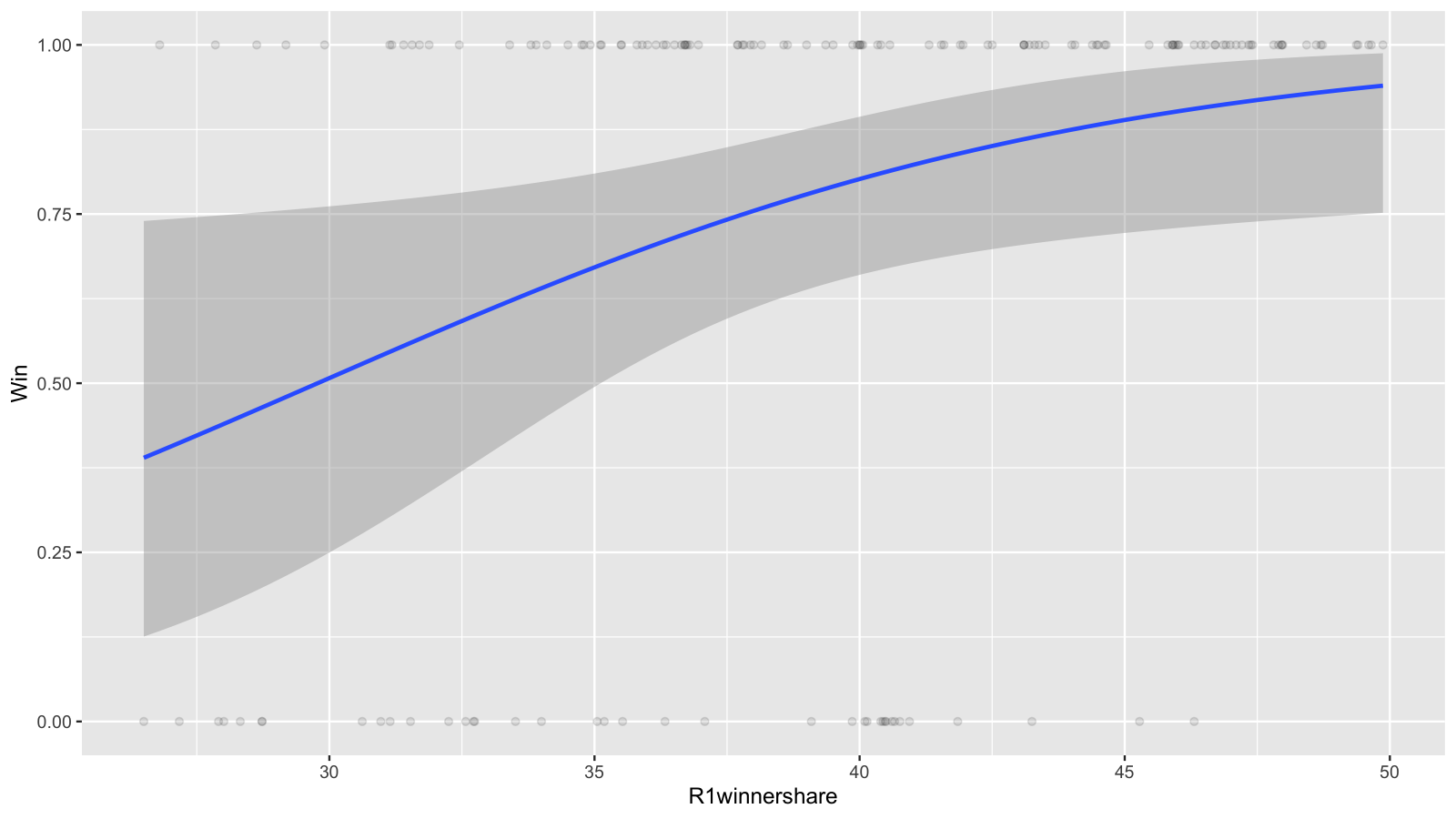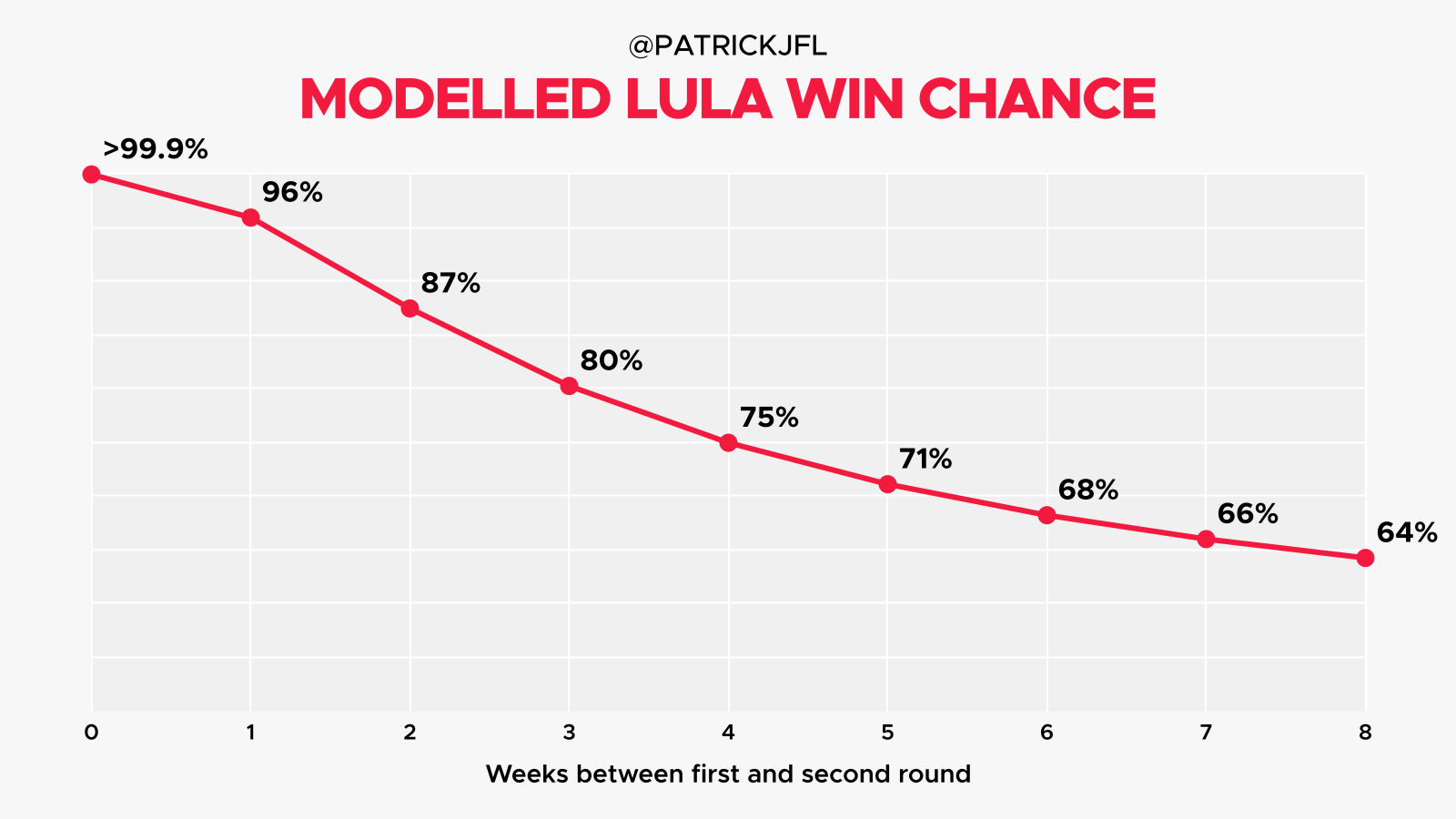
Forecasting run-off elections: Lula remains value
Patrick Flynn
11 October 2022
Despite finishing within touching distance of the 50% post last Sunday, Lula remains roughly as likely to win the Brazilian presidential election in the prediction markets as he was before the first round was held.
The leftist former president is still available to back at 1.43 (70%) on Smarkets, though he was briefly available at an enormous 1.74 (57%) on another platform on Sunday afternoon.
To assess whether his current price is a fair one, I have compiled the results of over 150 run-off elections across the world, allowing me to get a decent idea of what the base rate for a Lula win ought to be.
I found that the candidate who tops the poll in the first round goes on to win the run-off about 77% of the time. On the surface, it looks like Lula is underpriced, but this figure is highly contingent on two factors: the relative first-round vote shares of the two leading candidates, and the length of time between the first and second rounds.
Starting with the former — the vote share of the first-place finisher and the size of their lead are both significant factors in determining the probability of the run-off winner. Simply put, the closer to 50% the frontrunner gets in the first round, the more likely they are to win, and the bigger the gap to second place, the better.

Modelled win chances based only on the vote share of the first-round winner.
Inputting Lula and Bolsonaro’s vote shares into a logistic regression to predict the chance of each candidate winning, the former comes out with an 87% chance of winning an average run-off election.
However, when it comes to the length of time between rounds, electoral systems can differ wildly, and so can the results. UK mayoral elections, for example, conduct both rounds at once. When casting your vote for mayor of London, you get two columns on the ballot paper for your first and second preferences. If your first preference does not finish inside the top two, your vote is then transferred to your backup candidate. Under this system, voters need to have a pretty good idea of who will make the final two, lest they waste their second preference. On the other hand, the 2021 Ecuadorian presidential election had a gap of nine weeks between the two rounds, giving second-place finisher Guillermo Lasso plenty of time to overturn a 13-point deficit, which he ultimately did.
In elections where both rounds are conducted simultaneously, the first-round winner wins the run-off a massive 94% of the time. If the run-off is conducted one or two weeks later, that figure drops dramatically to 68%; and with a gap of three weeks or more, it falls even further to 60%.
The four-week gap between rounds in Brazil is comparatively high and is a major reason why Lula is still at the price he is. Ultimately, the longer the gap, the more time Bolsonaro has to mount a comeback. My modelling suggests that, were the election conducted under the UK mayoral system, Lula would be a near certainty (>99.9%) to win based on the first round results. The four week gap, however, means Lula has a base-rate win chance of 75%.

However, this is only the base rate and there are other factors at play which ought to be considered to make a better assessment.
The base rate supposes we have absolutely no information about how voters of the eliminated candidates will behave. In reality, both the third and fourth-placed candidates, Simone Tebet and Ciro Gomes, have endorsed Lula. While endorsements don’t automatically mean their voters will move en masse, one poll suggested that 92% of the centre-right Tebet’s voters would go to Lula, whereas (surprisingly) the left-of-centre Ciro’s voters were pretty evenly split.
Lula’s position is thus even stronger than it appears and his price in the market ought to be 1.2 (83%) or shorter. It feels like we’re repeating this ad nauseam in the Smarkets Politics team, but backing Lula to win in the 1.4–1.5 range is, in my view, the best value political bet you’ll see this year.
Patrick Flynn
11 October 2022

